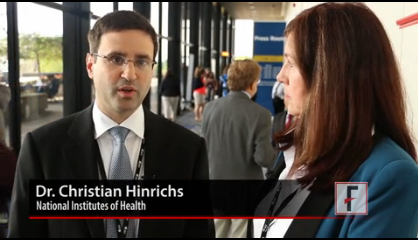User login
CHICAGO – For the first time, researchers have shown that immunotherapy using adoptive T-cell therapy can induce complete remission in metastatic cervical cancer.
The study involved just nine patients given a single infusion of human papillomavirus (HPV)-targeted T cell therapy, but is sparking enormous excitement.
To learn more, watch our interview at the annual meeting of the American Society of Clinical Oncology with lead study author Dr. Christian Hinrichs of the National Cancer Institute.
The study was supported by the National Cancer Institute, National Institutes of Health. The authors reported no financial disclosures.
The video associated with this article is no longer available on this site. Please view all of our videos on the MDedge YouTube channel
CHICAGO – For the first time, researchers have shown that immunotherapy using adoptive T-cell therapy can induce complete remission in metastatic cervical cancer.
The study involved just nine patients given a single infusion of human papillomavirus (HPV)-targeted T cell therapy, but is sparking enormous excitement.
To learn more, watch our interview at the annual meeting of the American Society of Clinical Oncology with lead study author Dr. Christian Hinrichs of the National Cancer Institute.
The study was supported by the National Cancer Institute, National Institutes of Health. The authors reported no financial disclosures.
The video associated with this article is no longer available on this site. Please view all of our videos on the MDedge YouTube channel
CHICAGO – For the first time, researchers have shown that immunotherapy using adoptive T-cell therapy can induce complete remission in metastatic cervical cancer.
The study involved just nine patients given a single infusion of human papillomavirus (HPV)-targeted T cell therapy, but is sparking enormous excitement.
To learn more, watch our interview at the annual meeting of the American Society of Clinical Oncology with lead study author Dr. Christian Hinrichs of the National Cancer Institute.
The study was supported by the National Cancer Institute, National Institutes of Health. The authors reported no financial disclosures.
The video associated with this article is no longer available on this site. Please view all of our videos on the MDedge YouTube channel
AT THE ASCO ANNUAL MEETING 2014
